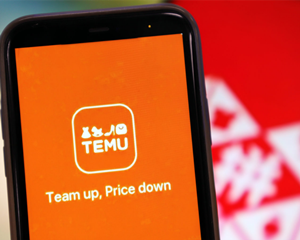Temu is the e-commerce phenomenon of the year -- an app for discounts that's come out of nowhere to rival giants like Amazon and Walmart.
Temu是今年电子商务领域的现象级产品,它是一款与亚马逊和沃尔玛等巨头展开竞争的折扣应用软件。
Temu, which is backed by a company in China called PDD, has been advertising heavily this year in the US,
由中国一家名为拼多多的公司资助的Temu,今年在美国投放了大量广告。
and that's made it the most downloaded app for most of the year, surpassing even the likes of OpenAI's ChatGPT.
这使其成为今年大部分时间里下载量最多的应用软件,甚至超过了OpenAI的ChatGPT等应用。
It's also frighteningly addictive.
它也会令人上瘾。
Once you install the software, you're immediately in the running to win vouchers worth $200 or even more if you buy quickly.
一旦你安装了该软件,你马上就有机会赢得价值200美元的代金券,如果你迅速下单的话,甚至会获得更多代金券。

That sets off a scramble to scroll through thousands of deals on items you never knew you wanted,
这就会使你匆忙浏览成千上万的、你从来不知道自己想要什么的品类,
like a cartoon shark sleeping bag for less than $15, or an electric nose hair trimmer for less than two bucks.
比如一个不到15美元的卡通鲨鱼睡袋,或者一个不到两美元的电动鼻毛修剪器。
Not everyone is convinced the app's success will last though.
不过,并不是所有人都认为这款应用的成功会持续下去。
The tech industry is littered with startups that have drawn millions of users by offering huge subsidies.
毕竟科技行业充斥着通过提供巨额补贴来吸引数百万用户的初创公司。
At Temu, customers complain sometimes about the quality of the products and the mistakes in delivery.
在Temu上,顾客有时会对产品质量和交货错误进行投诉。
Surveys by Morgan Stanley indicate more shoppers are beginning to cut spending on the platform than those who are increasing their purchases.
摩根士丹利的调查显示,在该平台上,相比购买量增加的人,更多的购物者开始削减支出。



